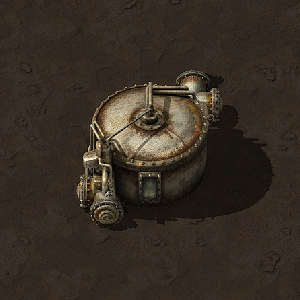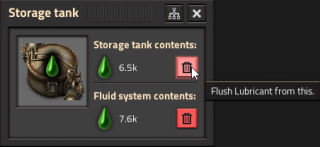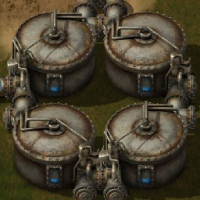Storage tank: Difference between revisions
SafwatHalaby (talk | contribs) (→Usage as "Energy-Tank": fixed some typos) |
|||
| (21 intermediate revisions by 7 users not shown) | |||
| Line 1: | Line 1: | ||
{{Languages}} | {{Languages}} | ||
{{About|the liquid storage container|the armored combat vehicle|Tank}} | |||
{{:Infobox:Storage tank}} | {{:Infobox:Storage tank}} | ||
The '''storage tank''' is a building that can store up to 25,000 units of a [[Fluid system|fluid]]. It is a passive [[storage]] — it has no input and no output, depending on pressure to fill it, essentially acting as a large [[pipe]]. | |||
The '''storage tank''' is a building that can store up to 25,000 units of a fluid. It is a passive | |||
== Usage == | == Usage == | ||
Storage tanks will only be filled to the same percentage of capacity as pipes that lead to it. | Storage tanks will only be filled to the same percentage of capacity as pipes that lead to it. A pipe that carries about 50 water will fill the tank to about 50% of its capacity. [[Pump]]s can be used to fill the entire tank from a low pressure source (such as distant [[pumpjack]]s). | ||
The storage tank is | The storage tank is often used to store raw materials and excess products from [[oil processing]], allowing a [[oil refinery|refinery]] to run without interruptions. It can also be connected to the [[circuit network]], sending the fluid contents as a signal to the network. | ||
The storage tank can be | The fluid inside the storage tank can be destroyed by flushing the storage tank or the whole fluid system in the GUI, or by mining and rebuilding the storage tank. The storage tank can be emptied without destroying the contained fluid by draining it with a [[pump]]. Mining a storage tank will send its contents to the next nearest storage tanks, if the fluids match. | ||
== Usage as "Energy- | == Usage as "Energy-tank" == | ||
Storage tanks can also be used as | :''See also: [[Electric system#Steam tanks as power storage|Steam tanks as power storage]]'' | ||
Storage tanks can also be used as a replacement for [[accumulator|accumulators]]. If steam consumption by [[steam engine]]s or [[steam turbine|turbines]] changes a lot over a daily cycle (for example due to [[solar panel]]s or [[laser turret]]s), storage tanks can be filled with steam during low power usage and then emptied during heavy load. | |||
A storage tank filled with [[heat exchanger]] 500°C steam stores around 2.4GJ; a storage tank filled with [[boiler]] 165°C steam stores 750MJ. | A storage tank filled with [[heat exchanger]] 500°C steam stores around 2.4GJ; a storage tank filled with [[boiler]] 165°C steam stores 750MJ. | ||
=== Calculations === | |||
* 1 '''Storage tank''' can store 25,000 units of 500ºC steam. | * 1 '''Storage tank''' can store 25,000 units of 500ºC steam. | ||
* 1 [[Steam turbine]] can output 5,820kW = 5,820kJ/s using 60 units of 500ºC steam/s. | * 1 [[Steam turbine]] can output 5,820kW = 5,820kJ/s using 60 units of 500ºC steam/s. | ||
* 1 Storage tank can keep 1 steam turbine working for 25,000 ∕ 60 ≈ 416.6667s | * 1 Storage tank can keep 1 steam turbine working at full capacity for 25,000 ∕ 60 ≈ 416.6667s | ||
* A Storage tank can store up to 25,000 ∕ 60 × 5,820 = '''2,425,000kJ''' using 500ºC steam. | * A Storage tank can store up to 25,000 ∕ 60 × 5,820 = '''2,425,000kJ''' using 500ºC steam. | ||
* 1 '''Storage tank''' can store 25,000 units of 165ºC steam. | * 1 '''Storage tank''' can store 25,000 units of 165ºC steam. | ||
* 1 [[Steam engine]] can output 900kW = 900kJ/s using 30 units of 165ºC steam/s. | * 1 [[Steam engine]] can output 900kW = 900kJ/s using 30 units of 165ºC steam/s. | ||
* 1 Storage tank can keep 1 steam engine working for 25,000 ∕ 30 ≈ 833.3333s | * 1 Storage tank can keep 1 steam engine working for 25,000 ∕ 30 ≈ 833.3333s | ||
* A Storage tank can store up to 25,000 ∕ 30 × 900 = '''750,000kJ''' using 165ºC steam. | * A Storage tank can store up to 25,000 ∕ 30 × 900 = '''750,000kJ''' using 165ºC steam. | ||
== Gallery == | |||
<gallery widths=320px heights=200px> | |||
File:Storage tank GUI.png|The storage tank's GUI with the ability to clear the contained fluid. | |||
File:storagetank.png|Four storage tanks linked together to form a large storage facility. | |||
</gallery> | |||
== History == | == History == | ||
{{history|0.15.7| | |||
* Reduced the mining time of the storage tank from 3 seconds to 1.5 seconds.}} | |||
{{history|0.15.0| | {{history|0.15.0| | ||
* Multiplied all fluid amounts by 10.}} | * Multiplied all fluid amounts by 10.}} | ||
| Line 49: | Line 51: | ||
{{history|0.12.0| | {{history|0.12.0| | ||
* Liquid inside can be seen through a small window. | * Liquid inside can be seen through a small window. | ||
* Now connectible to the circuit network.}} | * Now connectible to the [[circuit network]].}} | ||
{{history|0.9.1| | {{history|0.9.1| | ||
* | * Storage tank has 2.5 times bigger capacity (2500 lit-res) and takes longer to mine.}} | ||
{{history|0.9.0| | {{history|0.9.0| | ||
Revision as of 09:15, 4 November 2024
This article is about the liquid storage container. For the armored combat vehicle, see Tank.
| Storage tank |
The storage tank is a building that can store up to 25,000 units of a fluid. It is a passive storage — it has no input and no output, depending on pressure to fill it, essentially acting as a large pipe.
Usage
Storage tanks will only be filled to the same percentage of capacity as pipes that lead to it. A pipe that carries about 50 water will fill the tank to about 50% of its capacity. Pumps can be used to fill the entire tank from a low pressure source (such as distant pumpjacks).
The storage tank is often used to store raw materials and excess products from oil processing, allowing a refinery to run without interruptions. It can also be connected to the circuit network, sending the fluid contents as a signal to the network.
The fluid inside the storage tank can be destroyed by flushing the storage tank or the whole fluid system in the GUI, or by mining and rebuilding the storage tank. The storage tank can be emptied without destroying the contained fluid by draining it with a pump. Mining a storage tank will send its contents to the next nearest storage tanks, if the fluids match.
Usage as "Energy-tank"
- See also: Steam tanks as power storage
Storage tanks can also be used as a replacement for accumulators. If steam consumption by steam engines or turbines changes a lot over a daily cycle (for example due to solar panels or laser turrets), storage tanks can be filled with steam during low power usage and then emptied during heavy load.
A storage tank filled with heat exchanger 500°C steam stores around 2.4GJ; a storage tank filled with boiler 165°C steam stores 750MJ.
Calculations
- 1 Storage tank can store 25,000 units of 500ºC steam.
- 1 Steam turbine can output 5,820kW = 5,820kJ/s using 60 units of 500ºC steam/s.
- 1 Storage tank can keep 1 steam turbine working at full capacity for 25,000 ∕ 60 ≈ 416.6667s
- A Storage tank can store up to 25,000 ∕ 60 × 5,820 = 2,425,000kJ using 500ºC steam.
- 1 Storage tank can store 25,000 units of 165ºC steam.
- 1 Steam engine can output 900kW = 900kJ/s using 30 units of 165ºC steam/s.
- 1 Storage tank can keep 1 steam engine working for 25,000 ∕ 30 ≈ 833.3333s
- A Storage tank can store up to 25,000 ∕ 30 × 900 = 750,000kJ using 165ºC steam.
Gallery
History
- 0.15.7:
- Reduced the mining time of the storage tank from 3 seconds to 1.5 seconds.
- 0.15.0:
- Multiplied all fluid amounts by 10.
- 0.13.12:
- Fluid icon now scales with size of tank.
- 0.12.0:
- Liquid inside can be seen through a small window.
- Now connectible to the circuit network.
- 0.9.1:
- Storage tank has 2.5 times bigger capacity (2500 lit-res) and takes longer to mine.
- 0.9.0:
- Introduced


